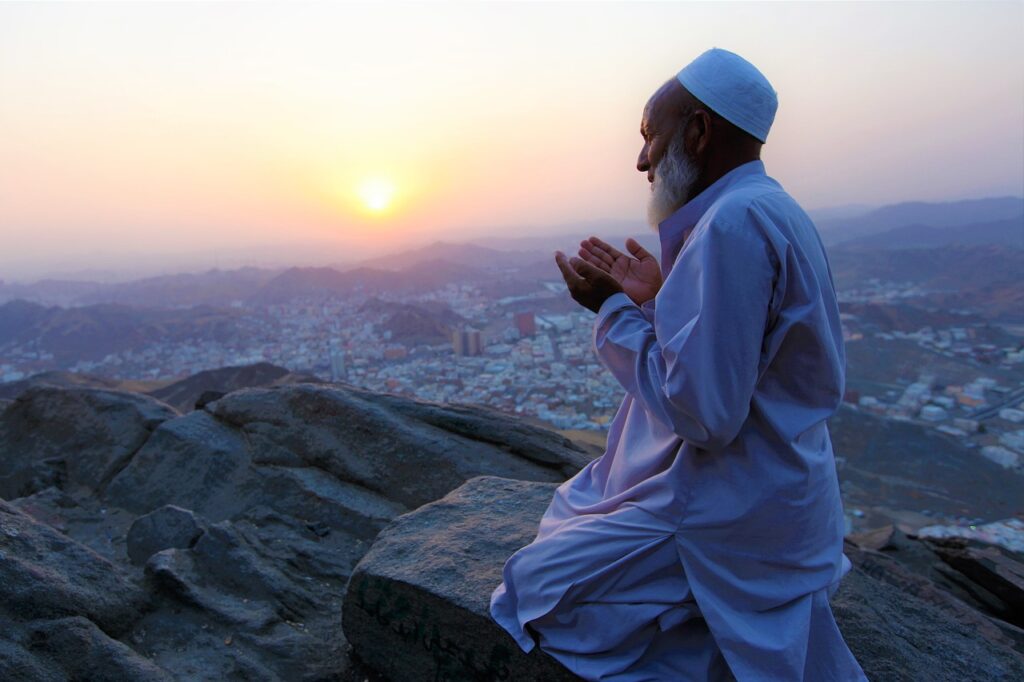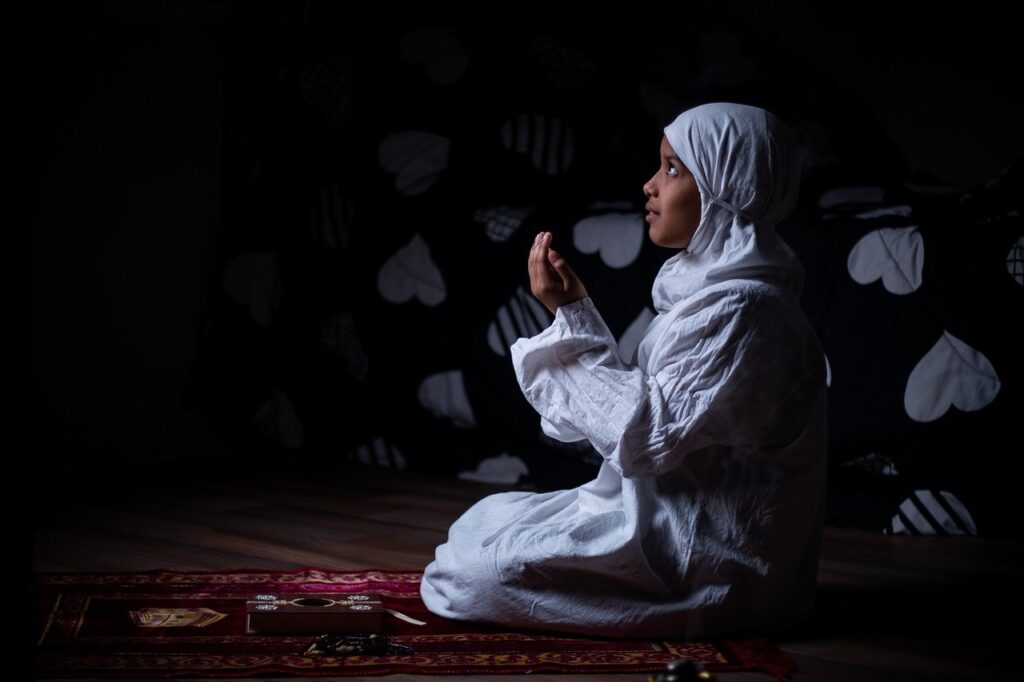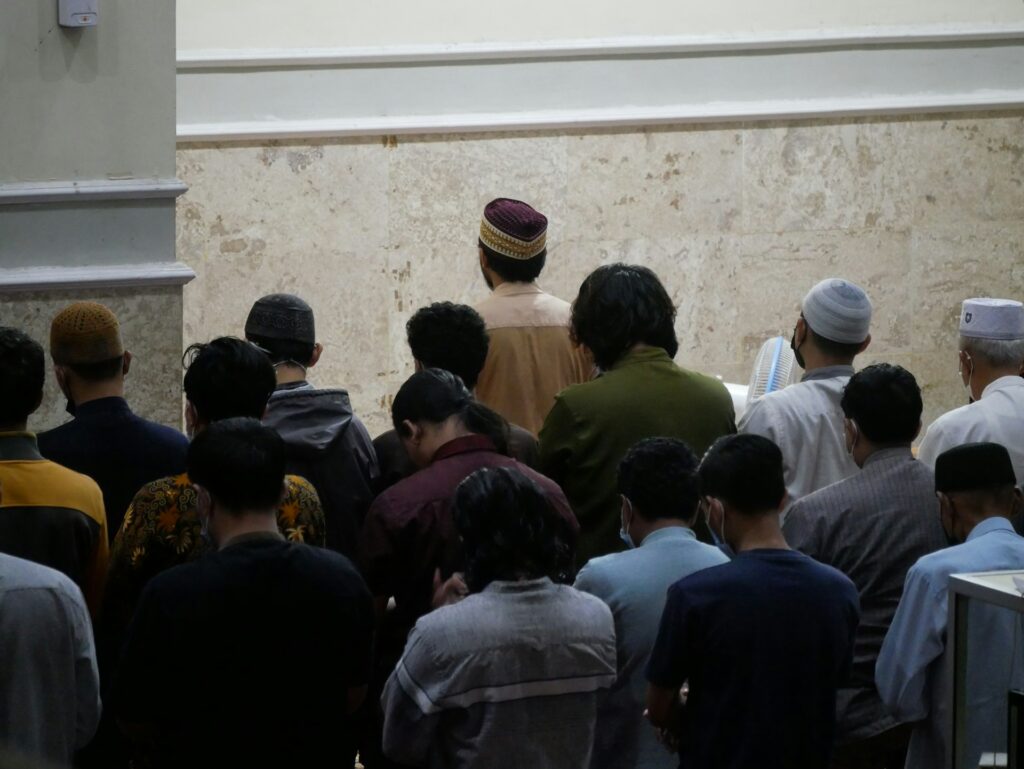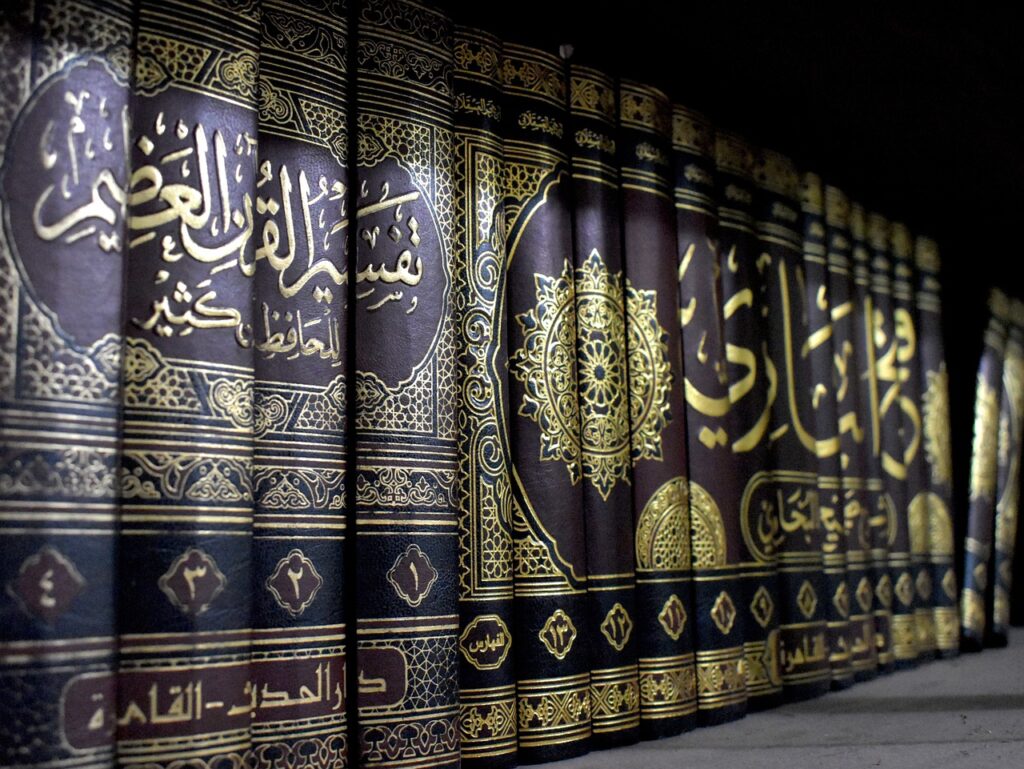
In the Name of Allah—the Most Compassionate, Most Merciful.
Islam places immense value on mothers. The Quran and the teachings of the Prophet Muhammad (صلى الله عليه و سلم) consistently highlight the importance of treating one’s mother with honour and deep appreciation.
We must express our gratitude and fulfil our religious obligations towards our beloved mothers who have given us so much.
This article explores the significance of mothers in Islam, focusing on the power of a mothers duas (supplications) and providing guidance on how to make dua for their well-being.
What Does Allah (سبحانه وتعالى) Say About Mothers in the Quran?
In the Quran, Allah (سبحانه وتعالى) frequently emphasises the importance of kindness and gratitude towards parents, particularly mothers. Numerous verses highlight the sacrifices mothers make for their children.
For instance, the Quran eloquently portrays the hardships mothers endure during pregnancy, childbirth, and the subsequent years of raising children.
In Surah Luqman, verse 14, Allah (سبحانه وتعالى) says:
This verse beautifully captures motherhood’s physical and emotional toll, highlighting the prolonged period of weakness and vulnerability mothers experience. It also underscores the importance of gratitude towards mothers, placing it alongside gratitude towards Allah (سبحانه وتعالى).
Additionally, in surah Al-Ahqaf, verse 15, Allah (سبحانه وتعالى) says:
The above verse underscores a mother’s role’s significance and unwavering commitment to her child’s well-being.
Furthermore, the Quran repeatedly mentions the rights of parents immediately after commanding the worship of Allah (سبحانه وتعالى) alone. This juxtaposition signifies the paramount importance of honouring and cherishing one’s parents, particularly mothers.
In addition to these specific verses, the Quran also talks about respecting and honouring one’s parents alongside worshipping Allah (سبحانه وتعالى), demonstrating the elevated status of parents in Islam.
Mother’s Status in Islam
Islam places an emphasis on honouring and respecting mothers. The Quran and the teachings of Prophet Muhammad (صلى الله عليه و سلم) repeatedly highlight the elevated status of mothers and the immense sacrifices they make.
This emphasis stems from recognising mothers’ vital role in nurturing, shaping, and guiding individuals and, by extension, society as a whole.
Mothers in the Hadith
The Prophet Muhammad (صلى الله عليه و سلم) emphasised the significance of mothers in numerous hadiths (sayings and traditions). Abu Huraira reported that a person said: Allah’s Messenger (ﷺ), who amongst the people is most deserving of my good treatment? He said:
This hadith powerfully illustrates the high status of mothers in Islam, highlighting their immense rights and the importance of prioritising their well-being.
The Rights of Mothers
Islam outlines several rights that mothers have over their children. These rights include:
- Respect and Obedience: Children must treat their mothers with utmost respect and obedience, even as they grow older. This includes speaking to them kindly, fulfilling their reasonable requests, and avoiding any actions that may cause them distress or displeasure.
- Gratitude and Appreciation: Children should express gratitude and appreciation for their mother’s sacrifices and unwavering love. This can be done through words, actions, and consistent acts of kindness and support.
- Care and Support: As mothers age, children are responsible for caring for and supporting them physically and emotionally. This includes ensuring their well-being, providing for their needs, and offering companionship and comfort.
The Rewards of Honouring Mothers
Honouring and respecting one’s mother is a moral obligation and a source of immense spiritual rewards. It was narrated from Mu’awiyah bin Jahimah As-Sulami, that Jahimah came to the Prophet (ﷺ) and said:
He said:
This hadith signifies that attaining Paradise is closely linked to fulfilling the rights of mothers and seeking their pleasure. By honouring their mothers, individuals pave the way for their own spiritual success and eternal happiness.
The status of mothers in Islam is one of immense reverence and honour. Mothers are recognised for their sacrifices, unwavering love, and profound influence on individuals and society.
Islam mandates that children treat their mothers with utmost respect, obedience, gratitude, and care. By fulfilling the rights of mothers, you fulfil your religious obligation and benefit from spiritual growth and eternal bliss.
The Power of Your Mother’s Dua
A mother’s dua holds exceptional significance in Islam. Firstly, the Prophet Muhammad(صلى الله عليه و سلم) emphasised the importance of parents’ duas, stating that they are among the most readily accepted by Allah (سبحانه وتعالى).
Consequently, a mother’s supplication for her child carries immense weight and has the potential to bring about profound blessings.
A mother’s love for her child is limitless, and her duas stem from a place of deep affection and genuine concern. This sincerity further amplifies the potency of her prayers. You should reciprocate the feelings of your beloved mother by making dua for her.
How to Make Dua for Your Mother?
Making dua for your mother is a beautiful way to express your love, gratitude, and respect for her. It is an act of worship that brings you closer to Allah (سبحانه وتعالى) and strengthens your bond with your mom.
Here are some steps to guide you in making heartfelt and effective duas for her well-being:
Step 1: Begin with Praising Allah (سبحانه وتعالى) and Send Salat on Prophet Muhammad ﷺ
You should commence your dua by expressing gratitude to Allah (سبحانه وتعالى) and sending salat on Prophet Muhammad ﷺ.
The Prophet (ﷺ) said:
Beginning your dua in this manner demonstrates humility and respect, creating the appropriate mindset for supplication. Making a due for your mother in this manner increases the chances of your duas being accepted.
Step 2: Make Dua for Your Mother’s Well-being
You must pray for your mother’s overall well-being. Ask Allah (سبحانه وتعالى) to grant her good health, both physical and mental. Ask Him to grant your mother strength and protect her from illness and harm.
Furthermore, you should supplicate for her happiness and contentment in this life and the hereafter. Beseech Allah (سبحانه وتعالى) to forgive her sins, grant her Jannah (Paradise), and elevate her status in the afterlife. Remember to be specific in your requests, mentioning any challenges or concerns your mother may face.
Step 3: Conclude with Durood on Prophet Muhammad (صلى الله عليه و سلم)
You must conclude your dua reciting durood (blessings) on Prophet Muhammad (صلى الله عليه و سلم) at the end of your dua.
Concluding your dua with a durood on Prophet Muhammad (صلى الله عليه و سلم) is important as one of his companions Umar bin Al-Khattab (may Allah be pleased with him) narrated:
Dua for Mother’s Health
A mother’s well-being is a precious gift, and praying for her continued health is an act of profound love and devotion. These heartfelt duas invoke Allah (سبحانه وتعالى) ‘s mercy and healing upon your mother, seeking His protection and granting her strength and vitality.
Arabic
English Translation
Take away the pain, O Lord of mankind, and grant healing, for You are the Healer, and there is no healing but Your healing that leaves no trace of sickness.
English Transliteration
Adhhibil-bas, Rabban-nas, washfi Antash-Shafi, la shifa’a illa shifa’uka shifa’an la yughadiru saqama
Arabic
English Translation
O the Lord of the people! Remove the trouble The cure is in Your Hands, and there is none except You who can remove it (the disease).
English Transliteration
Imsahil-ba’sa Rabban-naas, bi yadikash-shifa, la kashifa lahu illa ant.
Dua for Mother’s Happiness
A mother’s happiness is a source of joy for her children. These duas seek to fill your mother’s life with happiness, contentment, and inner peace.
Arabic
English Translation
O Allah! I seek refuge in you from the withholding of your favor, the decline of the good health you have given, the suddenness of your vengeance and from all forms of your wrath.
English Transliteration
Allahumma inni a’udhu bika min zawali ni’matika, wa tahawwuli ‘afiatika, wa faja’ati niqmatika, wa jami’i sakhatika.
Dua for Mother to be Accepted in Jannah
Jannah is the ultimate reward for believers, and praying for your mother’s entry into Paradise is a testament to your deep love and concern for her eternal well-being. The following dua seek Allah (سبحانه وتعالى) ‘s forgiveness and mercy for your mother, guiding her towards a path that leads to His eternal Paradise.
Arabic
Transliteration
Rabbigh fir lee wa liwaa lidaiya wa liman dakhala baitiya mu’minanw wa lil mu’mineena wal mu’minaati wa laa tazidiz zaalimeena illaa tabaaraa
English Translation
My Lord, forgive me and my parents and whoever enters my house a believer and the believing men and believing women. And do not increase the wrongdoers except in destruction.
Dua for Mother’s Forgiveness
We all make mistakes, and seeking forgiveness for our loved ones is an act of compassion and concern. This dua asks Allah (سبحانه وتعالى) to forgive your mother’s past transgressions and grant her mercy.
Arabic
Transliteration
Rabbighfirli Waliwalidayya Walil Mumineen Yauma Yaqoomul Hisab
English Translation
Our Lord! Forgive me, my parents, and the believers on the Day when the judgment will come to pass.
Dua for Mother’s Guidance
Guidance is a precious gift from Allah (سبحانه وتعالى) , and praying for your mother’s continued guidance expresses your desire for her to remain steadfast on the path of righteousness.
Here is a dua asking Allah (سبحانه وتعالى) to have mercy on your mother.
Arabic
Transliteration
Rabbi irhamhuma kama rabbayani sagheera
English Translation
My Lord, have mercy upon them as they brought me up [when I was] small.
Dua for Mothers to Have a Long Life
A long and fulfilling life is a blessing from Allah (سبحانه وتعالى) . Every child desires their mother to enjoy a long life filled with health, happiness, and blessings. Here is a general asking Allah (سبحانه وتعالى) to grant your mother good health and happiness in this life and the hereafter.
Arabic
Transliteration
Rabbanaaa aatina fid dunyaa hasanatanw wa fil aakhirati hasanatanw wa qinaa azaaban Naar.
English Translation
Our Lord! Grant us the good of this world and the Hereafter, and protect us from the torment of the Fire.
Dua for Mother Who Passed Away (Deceased)
The loss of a mother is a profound grief, but our connection with them continues through prayer. Here is a heartfelt dua for a mother who has passed away.
Arabic
اللَّهُمَّ اغْفِرْ لِحَيِّنَا وَمَيِّتِنَا وَشَاهِدِنَا وَغَائِبِنَا وَصَغِيرِنَا وَكَبِيرِنَا وَذَكَرِنَا وَأُنْثَانَا اللَّهُمَّ مَنْ أَحْيَيْتَهُ مِنَّا فَأَحْيِهِ عَلَى الإِسْلاَمِ وَمَنْ تَوَفَّيْتَهُ مِنَّا فَتَوَفَّهُ عَلَى الإِيمَانِ
Transliteration
Allāhammaghfir li hayyinā wa mayyittinā, wa shāhidinā wa ghā ibinā, wa saghīrinā wa kabīrinā, wa dhakarinā wa unthanā. Allāhumma man ahyaitahū minnā, fa ahyihī ‘alal islām, wa man tawaffaitahū minnā, fatawaffahū ‘alal īman.
English Translation
O Allah! Forgive our living and our deceased, our present and our absent, our young and our old, our male and our female. O Allah, to whomsoever of us Thou givest life grant him life as a believer, and whomsoever of us Thou takest in death take him in death as a follower of Islam. O Allah, do not withhold from us the reward (of faith) and do not lead us astray after his death.
Dua Database of Other Islamic Prayers
Want to read more duas? You can read a comprehensive collection of duas for various occasions and needs on our dua database of Islamic prayers.
Some of the duas you can read in the database include:
- Dua against Depression
- Dua of Prophet Ibrahim
- Dua for travelling
- Dua for exam success
- Dua for stress relief
- Dua for Success
- Dua before going to bed
- Dua for pain
- Dua for wealth
- Dua to remove all problems
- Dua, after waking up
- Dua, after leaving the house
- Dua for Rizq
- Dua against shaytan and jinn
- Morning Dua
- Dua for anxiety
- Dua for healing
- Duas for thanking Allah SWT
- Dua before going to bed
- Dua against the evil eye and Nazar
- Dua of Prophet Adam for forgiveness
The duas cover many topics, from seeking protection and guidance to expressing gratitude and forgiveness.
Reciting these supplications will help you connect with Allah on a deeper level and seek His blessings in all aspects of your life. We encourage you to explore our diverse database and discover supplications that resonate with you.
Summary – Duas for mother
Duas and supplications for our mothers emphasise the importance of honouring, respecting, and cherishing our mothers.
These duas recognise their endless sacrifices and unconditional support. They encourage us to make heartfelt duas (prayers) for their happiness, health, and blessings in this world and the next, acknowledging the invaluable role they play in our lives.
May we all strive to make dua for our beloved mothers’ happiness and well-being in this life and the hereafter.



















